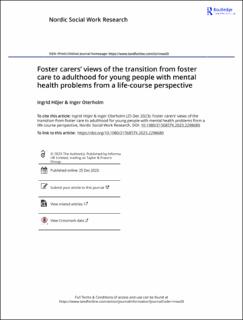| dc.contributor.author | Höjer, Ingrid | |
| dc.contributor.author | Oterholm, Inger | |
| dc.date.accessioned | 2024-01-04T09:03:22Z | |
| dc.date.available | 2024-01-04T09:03:22Z | |
| dc.date.created | 2023-12-27T10:52:15Z | |
| dc.date.issued | 2023 | |
| dc.identifier.citation | Nordic Social Work Research. 2023, 1-14 | en_US |
| dc.identifier.issn | 2156-857X | |
| dc.identifier.uri | https://hdl.handle.net/11250/3109743 | |
| dc.description | This is an Open Access article distributed under the terms of the Creative Commons Attribution License (http://creativecommons.org/licenses/by/4. 0/), which permits unrestricted use, distribution, and reproduction in any medium, provided the original work is properly cited. The terms on which this article has been published allow the posting of the Accepted Manuscript in a repository by the author(s) or with their consent. | en_US |
| dc.description.abstract | This article aims to build knowledge, from a life-course perspective, of foster carers’ views of the transition from care to adulthood for young people with mental health problems. The following research questions were addressed: How do mental health problems affect the care-leaving process and the linked lives between young people and foster carers? What impacts do young people’s mental health problems have on the timing of lives and social age when they leave a placement in care? We interviewed 18 carers from 13 foster homes in Norway and 17 carers from 14 foster homes in Sweden. The results show how young people’s mental health problems could prevent carers from providing social support to and maintaining positive relations with the young people. This could be because of the young people’s unwillingness to accept support, because their difficulties made them avoid contact, or because they did not want their former carers to know about the problems they were encountering. Mental health problems were a source of concern for the foster carers and of worry for the young people. Carers continued to find ways to help and be available when the young people allowed contact – the lives of the carers and the young people were still linked. It is important to recognize and address the impact of mental health on the care-leaving process and to provide adequate and timely support to young people and foster carers. | en_US |
| dc.language.iso | eng | en_US |
| dc.publisher | Routledge | en_US |
| dc.rights | Navngivelse 4.0 Internasjonal | * |
| dc.rights.uri | http://creativecommons.org/licenses/by/4.0/deed.no | * |
| dc.subject | life-course perspective | en_US |
| dc.subject | mental health problems | en_US |
| dc.subject | care-leaving | en_US |
| dc.subject | young people | en_US |
| dc.subject | foster carers | en_US |
| dc.title | Foster carers´views of the transition from foster care to adulhood for young people with mental health problems form a life-course perspective | en_US |
| dc.type | Peer reviewed | en_US |
| dc.type | Journal article | en_US |
| dc.description.version | publishedVersion | en_US |
| dc.rights.holder | © 2023 The Author(s). Published by Informa UK Limited, trading as Taylor & Francis Group | en_US |
| dc.source.pagenumber | 1-14 | en_US |
| dc.source.journal | Nordic Social Work Research | en_US |
| dc.identifier.doi | 10.1080/2156857X.2023.2298680 | |
| dc.identifier.cristin | 2217651 | |
| cristin.ispublished | true | |
| cristin.fulltext | original | |
| cristin.qualitycode | 1 | |

